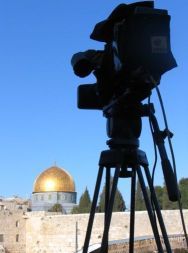 Everything you need to know about today’s media coverage of Israel and the Mideast.
Everything you need to know about today’s media coverage of Israel and the Mideast.
A Time magazine journo is confused about what Palestinians mean when they say “popular resistance.” And the number of policy stakeholders in the Mughrabi Gate ramp’s fate is getting out of hand.
Iranian Atomic Urgency
• Washington Post: Mysterious explosions pose dilemma for Iranian leaders.
• A Norwegian professor says containing a nuclear Iran is preferable to attacking it now. Malfrid Braut-Hegghammer writes in the NY Times:
Israelis tend to credit this attack for denying Iraq a nuclear weapons capability. However, sources that have emerged since 2003 demonstrate that the attack created an unprecedented Iraqi consensus about the need for a nuclear deterrent and triggered a more intensive effort to acquire them. By the 1991 Gulf War, Iraq stood on the threshold of a nuclear weapons capability.
What is known about Iran’s nuclear program suggests an attack could have similar consequences.
• Iran downgrades relations with Britain. The UK ambassador will have to leave the country in two weeks while the embassy will be run by a charge d’affaires. More at Reuters.
Peace Process
 • Karl Vick must have been wearing rose-colored glasses when he wrote up this assessment of Hamas/Fatah unity efforts. The Time correspondent really believes Hamas is moderating itself.
• Karl Vick must have been wearing rose-colored glasses when he wrote up this assessment of Hamas/Fatah unity efforts. The Time correspondent really believes Hamas is moderating itself.
Afterwards both met the cameras smiling. “There are no differences between us now,” Abbas said. Mashaal went with: “We have opened a new page of partnership.” And on whose terms? Hamas stands for resistance, its formal name being the Islamic Resistance Movement. But in the Gaza Strip where it governs, Hamas has largely enforced a truce with Israel since January 2009. And in Cairo it signed a paper committing itself to “popular resistance” against the Israeli occupation of Palestinian territories. That’s “popular” in contrast to “violent” or “military” resistance. We’re talking marches here. Chanting and signs, not booby traps or suicide bombs.
“Every people has the right to fight against occupation in every way, with weapons or otherwise. But at the moment, we want to cooperate with the popular resistance,” Meshaal told AFP. “We believe in armed resistance but popular resistance is a program which is common to all the factions.”
I responded to Vick’s assessment by pointing out that the word “popular” means “grassroots,” not “peaceful” as in the Popular Resistance Committees responsible for kidnapping Gilad Shalit.
• Yesterday, I thought UNESCO and the PA were the biggest threat to the Church of the Nativity and the renovations it may be undergoing. But The Independent says it ain’t so:
But it is the explosive tensions between the Christian custodians that are the greatest threat to the basilica.
The three communities with rights to the church – the Greek Orthodox, the Armenian Orthodox and the Roman Catholics – can all find the money to repair it. But none of the three sects has been willing to allow the others to pay for repairs, fearful that it will give the others a right to a part of the church that is not theirs.
• Hamas and Fatah scheduled elections for May 4. My prediction: By the end of February, the election will be postponed or cancelled for one reason or another.
• The Guardian breaks out the violins for PA employees who haven’t been paid because Israel’s withholding tax transfers. Later in the day, press reports like YNet News said Netanyahu’s is going to resume the money transfer, despite opposition from Avigdor Lieberman.
• Gaza energy officials accuse Israel of already disconnecting its grid from the strip. More at Maan News.
• Chicago Sun-Times columnist Neil Steinberg discussed peace efforts with Orli Gil, Israel’s consul general in the Windy City.
Arab Spring
• The Arab League approved sanctions on Syria, “including freezing the assets of senior figures, banning high-level Syrian officials from visiting Arab nations and ending dealings with the country’s central bank.” BBC rounds up some Arab media reax.
• Voice of America has a timeline of Egypt’s complicated electoral process. Staggered voting for the upper and lower houses of parliament will draw out until March. If the results are explosive, it’ll redefine March Madness.
Rest O’ the Roundup
 • Demolishing the old pedestrian footbridge leading up to the Temple Mount’s Mughrabi Gate is one big headache.
• Demolishing the old pedestrian footbridge leading up to the Temple Mount’s Mughrabi Gate is one big headache.
According to Haaretz, an Israeli plan to raze the bridge and replace it has become A) an election issue in Egypt, B) a political triangle between the PA, UNESCO and Jordan, and C) a point of contention between the Israeli govt, the Jerusalem municipality, and the Western Wall Foundation.
For now, the prime minister is asking that the demolition be delayed — presumably after Egypt’s elections. AFP also picked up on the story.
Related reading: Mughrabi Gate: The Real Dirt
• Israel’s ambassador to Britain, Daniel Taub, spoke at the Manchester Big Tent gathering. The last ‘graph of this Jewish Chronicle piece is a nice media-related snippet. He’s referring to Deborah Orr‘s ugly commentary.
The ambassador also condemned an antisemitic “sickness” inside some parts of the British media.
“When a leading newspaper publishes antisemitic words, such as we heard on the release of Gilad Shalit alleging that this deal shows that Zionists values the lives of the ‘chosen’ more than it values the lives of anyone else – as if we wouldn’t have begged to reduce the number of terrorists that should have been released – yes, that’s insulting to Israel, but more than that, it’s a sign of a great sickness inside media and inside British journalism,” he said.
• AP looks at Jerusalem’s religious/secular gender wars and the “battle” for free speech.
• The last Jews of Baghdad — all seven of them — are in danger because their names were published by WikiLeaks. You can listen to the sad story at the BBC. The Times of London writes:
They fear that if they are identified, extremists will kill them . . .
The group recently asked the American Embassy whether there were any Jewish diplomats who could join them in religious ceremonies, making up the number required under Jewish law. Their names were revealed when diplomatic cables from Baghdad were published by WikiLeaks.
More links at Harry’s Place.
• Reuters: Sinai saboteurs blew up the Egypt-Israel-Jordan gas pipeline again. I can’t decide whether to blame it on settlements or Tim Tebow.
• Ben White (The New Statesman) picks at sore points in the UK hasbara community.
• No BDS flashmobs in Provo, Utah. Mayor John Curtis recently returned from a trip to Israel with other US mayors. “Hizzoner” shared his thoughts with the Daily Herald and blogged the visit too.
(Image of rose glasses via Flickr/derekGavey)

